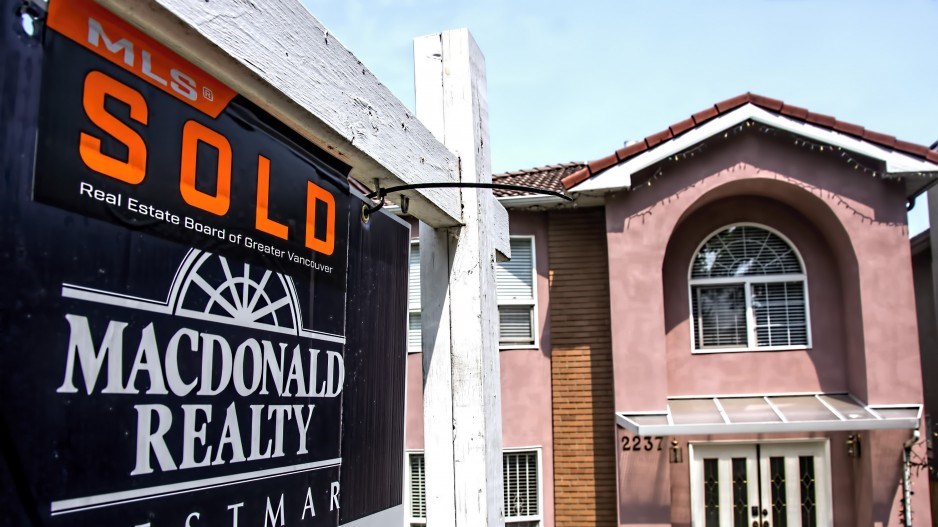Greater Vancouver real estate activity started off as expected in 2023 but quickly changed course in the spring, surprising industry experts.
A renewal of activity in the region can be attributed to a combination of factors, including pent-up buyer demand, population growth and sellers’ fear of missing out, said Brendon Ogmundson, chief economist at the British Columbia Real Estate Association.
“These couple of months are a bit of an anomaly. Usually the impact of rate hikes is really persistent, and we would expect to see sales below normal for a long time,” he said.
The year started with market activity below normal levels, thanks to a Bank of Canada rate hike campaign in 2022 that carried over into 2023. Eight consecutive rate hikes brought the bank’s policy rate to 4.50 per cent in January 2023 – the highest it had been since January 2008. Another 25-basis-point rate hike in June 2023 brought the rate to 4.75 per cent, and many anticipate it will reach five per cent in July.
Higher borrowing rates were expected to depress local real estate activity throughout much of 2023. Then, April sales and prices rose to normal market levels, though activity has since eased, Ogmundson said.
“[June] month started very strong and then once the Bank of Canada raised rates … that probably took some wind out of the sails of the market,” he said.
Home sales in January of this year reached 1,022 for all housing types, 42.9 per cent below the 10-year sales average for the month. Fast forward to May, home sales reached 3,411, down 1.4 per cent from the seasonal average, according to the Real Estate Board of Greater Vancouver (REBGV).
“It speaks to a number of factors and one is that Vancouver, and our region, has a lot of people who are capitalized well enough to afford the high prices. It’s always a story about affordability,” said Andrew Lis, director of economics and data analytics with REBGV.
At the beginning of 2023, REBGV was one of the only organizations to predict an increase in prices, according to Lis.
“All of the models wanted to drive the price growth trajectory higher, despite a higher interest rate scenario,” said Lis.
Low inventory across the region meant any kind of surge in demand that was put into the model resulted in price growth, he said.
“Putting that out at the time, we got a lot of calls,” he said. “Here we are today, six months later, and sure enough there’s price growth.”
Between January and May, the benchmark price across all housing types throughout the Lower Mainland increased by 6.6 per cent to $1,188,000 from $1,114,800, according to Lis.
As prices rose over the course of spring, the gap in pricing between real estate in desirable and less-desirable areas has been closing, said Jesse Kleine, real estate agent at Sutton Group. The first half of this year, he said, has been “shocking.”
At the time of publication, one of Kleine’s buyers was looking at a home in New Westminster for $1.56 million. The buyer had shared with Kleine that his mother-in-law had just bought a newly renovated house in Vancouver for $1.8 million.
“He said: ‘The gap is so small. This doesn’t make any sense to go from the suburbs and find this in the city of Vancouver.’ And he’s right, it never was like that,” said Kleine. “Vancouver ran ahead of everything; nobody could buy there anymore and everyone got pushed out.”
More buyers are starting to look east at Alberta – specifically Calgary – said Amy Leong, a real estate agent with Engel and Voelkers Vancouver.
“[Calgary developers] are reaching out to Vancouver realtors for residential projects because they’re feeling the same thing. The demand has shifted east to our neighbour since our prices here are still really, really high,” she said.
Among the neighbourhoods that people in Vancouver are buying into, Leong sees the area around False Creek as a locale to lookout for.
“That pocket and in and around the seawall, you can buy suites there for lower or the same as they were priced five years ago,” she said.
Benchmark pricing for Vancouver East and Vancouver West, which accounts for downtown, has changed by 0.2 per cent and 0.5 per cent, respectively, in the past five years, according to the REBGV.
Both Kleine and Lis said that the “middle market” and townhomes have remained resilient throughout the year, despite economic factors.
“It’s a segment of the market that is certainly interest rate sensitive, but not maybe as much as the apartment segment. [The townhome] segment of the market has done pretty well, in terms of sales and pricing moving up,” Lis said.
The market for entry-level townhomes is influenced by first- and second-time buyers – individuals who are motivated by life changes such as having kids or getting married and are able to use a dual income to their advantage, according to Kleine.
Both Leong and Kleine noted that it takes approximately two weeks to one month for one of their units or properties to sell.
“It just has to be priced properly.… That’s because of the low inventory here. There isn’t a lot to choose from and with all the immigration we experienced, people are still wanting to be here,” said Leong.




